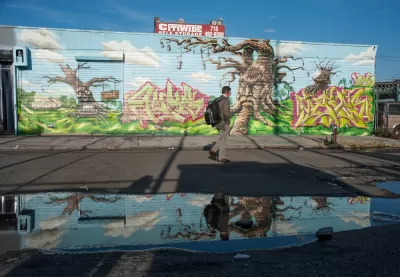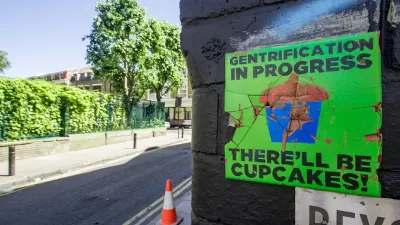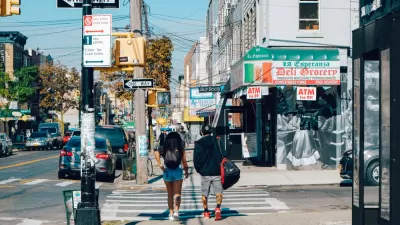Journalist Peter Markowitz has written a provocative, and profoundly disingenuous, analysis of the causes and effects of gentrification in American cities. He sows division at a time that requires collaboration, writes Josh Stephens.

"Gentrification, by which Moskowitz refers to a range of urban crises that he considers, not unreasonably, to be violent, discriminatory, and unjust, is the most vivid and surely most emotionally fraught of the great urban challenges that American cities face. Moskowitz discusses the issue passionately and urgently -- and totally disingenuously."
"He mentions housing scarcely more often than he does jobs, and only then to promote subsidized affordable housing. Never mind the fact that, at least in New York and the Bay Area, it’s the lack of housing supply (both market rate and subsidized) that drives up prices and drives out residents who can’t afford those prices. Capital salivates when restrictive zoning, which typically has little to do with Goldman Sachs and much to do with incumbent homeowners, drives up real estate values."
"I get it. Capitalism is ruthless. The United States is racist. Governments, especially the feds, have betrayed the poor. Moskowitz is more than entitled to illustrate those flaws. But you know what else is flawed? Disingenuously complaining about a deadly serious matter without offering constructive, viable solutions."
"Herein lies the danger of How to Kill a City: it is a deliberately antagonistic book. And there are millions of people across this country who might take it seriously. (As of this writing, it’s the number-one seller in its category on Amazon.) Moskowitz clearly doesn't believe in collaboration, compromise, or common prosperity. Meaning, he doesn't really believe in cities."
FULL STORY: Death by Gentrification: Review of 'How to Kill a City'

Planetizen Federal Action Tracker
A weekly monitor of how Trump’s orders and actions are impacting planners and planning in America.

Restaurant Patios Were a Pandemic Win — Why Were They so Hard to Keep?
Social distancing requirements and changes in travel patterns prompted cities to pilot new uses for street and sidewalk space. Then it got complicated.

Map: Where Senate Republicans Want to Sell Your Public Lands
For public land advocates, the Senate Republicans’ proposal to sell millions of acres of public land in the West is “the biggest fight of their careers.”

Orange County, Florida Adopts Largest US “Sprawl Repair” Code
The ‘Orange Code’ seeks to rectify decades of sprawl-inducing, car-oriented development.

Maui's Vacation Rental Debate Turns Ugly
Verbal attacks, misinformation campaigns and fistfights plague a high-stakes debate to convert thousands of vacation rentals into long-term housing.

San Francisco Suspends Traffic Calming Amidst Record Deaths
Citing “a challenging fiscal landscape,” the city will cease the program on the heels of 42 traffic deaths, including 24 pedestrians.
Urban Design for Planners 1: Software Tools
This six-course series explores essential urban design concepts using open source software and equips planners with the tools they need to participate fully in the urban design process.
Planning for Universal Design
Learn the tools for implementing Universal Design in planning regulations.
Heyer Gruel & Associates PA
JM Goldson LLC
Custer County Colorado
City of Camden Redevelopment Agency
City of Astoria
Transportation Research & Education Center (TREC) at Portland State University
Camden Redevelopment Agency
City of Claremont
Municipality of Princeton (NJ)





























